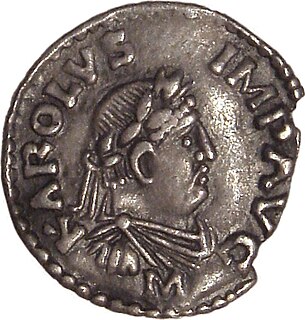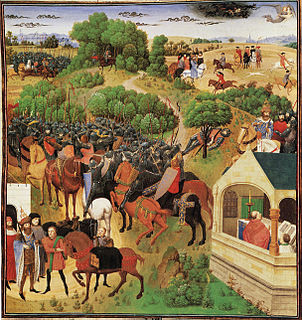Naimon, Duke of Bavaria, also called Naimes, Naime, Naymon, Namo, and Namus, is a character of the Matter of France stories concerning Charlemagne and his paladins, and appears in Old French chansons de geste (like The Song of Roland ) and Italian romance epics. He is traditionally Charlemagne's wisest and most trusted advisor.

Bavaria, officially the Free State of Bavaria, is a landlocked federal state of Germany, occupying its southeastern corner. With an area of 70,550.19 square kilometres, Bavaria is the largest German state by land area comprising roughly a fifth of the total land area of Germany. With 13 million inhabitants, it is Germany's second-most-populous state after North Rhine-Westphalia. Bavaria's main cities are Munich and Nuremberg.
The Matter of France, also known as the Carolingian cycle, is a body of literature and legendary material associated with the history of France, in particular involving Charlemagne and his associates. The cycle springs from the Old French chansons de geste, and was later adapted into a variety of art forms, including Renaissance epics and operas. Together with the Matter of Britain, which concerned King Arthur, and the Matter of Rome, comprising material derived from and inspired by classical mythology, it was one of the great literary cycles that figured repeatedly in medieval literature.

Charlemagne or Charles the Great, numbered Charles I, was king of the Franks from 768, king of the Lombards from 774, and emperor of the Romans from 800. He united much of western and central Europe during the Early Middle Ages. He was the first recognised emperor to rule from western Europe since the fall of the Western Roman Empire three centuries earlier. The expanded Frankish state that Charlemagne founded is called the Carolingian Empire. He was later canonized by Antipope Paschal III.
In the Song of Roland , Naimon supports Ganelon's proposal to make peace with King Marsile. He does not suspect Ganelon's treachery. Later, he organizes the divisions of Charlemagne's army and participates in the battle against Baligant.

In the Matter of France, Ganelon is the knight who betrayed Charlemagne's army to the Muslims, leading to the Battle of Roncevaux Pass. His name is said to derive from the Italian word inganno, meaning fraud or deception. He is based upon the historical Wenilo, the archbishop of Sens who betrayed King Charles the Bald in 858.
Marsile is a character in the French heroic poem The Song of Roland. He is the Muslim king of the Saracens. He first appears in Stanza 1, asking his barons for counsel because he is losing the war against Charlemagne. He readily accepts Blancandrin's proposal of surrender, and agrees to Ganelon's scheme after testing his worth and persuasion from his wife Bramimonde and his nobility (32–52). He takes part in the Battle of Roncevaux Pass, kills Bevon, Lord of Beaune and Dijon, Yvoire, Yvon and Gerald of Roussillon, before Roland takes his right hand and his son, Jurfaleu the Blond and is forced to flee (142) to Saragossa (187). Bound to his bed with his injuries, he summons help from Baligant (189), places Spain in Baligant's care (202), and later dies of his wounds, his army having been destroyed.
In The Song of Roland, Baligant is the Emir of Babylon, who tries to aid the defense of Zaragoza from Charlemagne. He is sometimes described as a man from ancient times. He is killed in the ensuing battle. He comes to the aid of his vassal King Marsile and brings an immense army to fight Charlemagne. He is often seen as the parallel of Charlemagne, both being old, handsome and skillful with a sword. One might say they were equals, except that Charlemagne had the help of Saint Gabriel.
In Le Pèlerinage de Charlemagne he is included among the Twelve Peers.
Le Pèlerinage de Charlemagne or Voyage de Charlemagne à Jérusalem et à Constantinople is an Old French chanson de geste dealing with a fictional expedition by Charlemagne and his knights. The oldest known written version was probably composed around 1140. Two 15th-century reworkings of the story are also known.
In later romances he is given a son, Sir Bertram. [1]
In Orlando Furioso he appears at the beginning of the story, holding Angelica captive.

Orlando Furioso is an Italian epic poem by Ludovico Ariosto which has exerted a wide influence on later culture. The earliest version appeared in 1516, although the poem was not published in its complete form until 1532. Orlando Furioso is a continuation of Matteo Maria Boiardo's unfinished romance Orlando Innamorato. In its historical setting and characters, it shares some features with the Old French Chanson de Roland of the eleventh century, which tells of the death of Roland. The story is also a chivalric romance which stemmed from a tradition beginning in the late Middle Ages and continuing in popularity in the 16th century and well into the 17th.

Angelica is a princess in the epic poem Orlando innamorato by Matteo Maria Boiardo. She reappears in the saga's continuation, Orlando furioso by Ludovico Ariosto, and in various later works based on the two original Orlando pieces. The narratives are part of the Matter of France, a cycle of legendary history stories based on the adventures of Charlemagne and his paladins.
Naimon's character may be summarized thus:
This same Naimon, the traditional adviser of the king, this medieval Nestor, this uncompromising advocate of Right against Might, is the most unchanging figure among the heroes. He is the embodiment of good sense, moderation and justice. [2]



